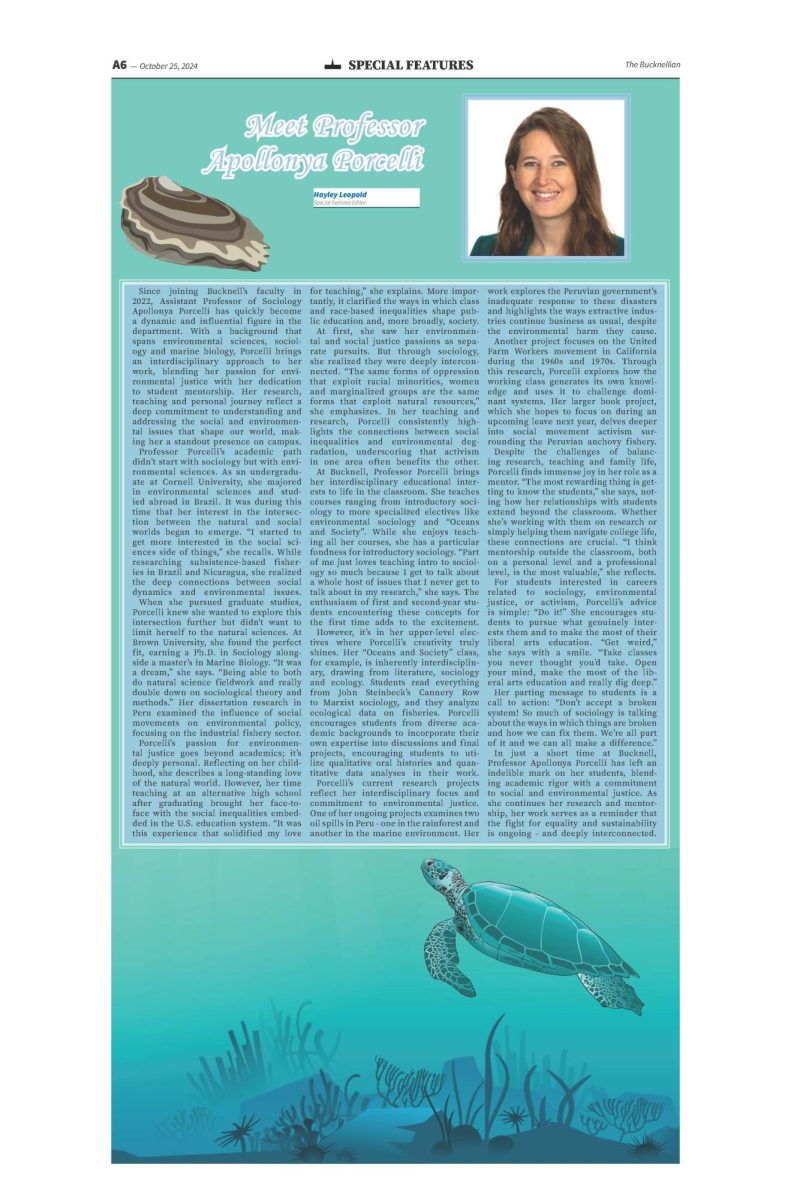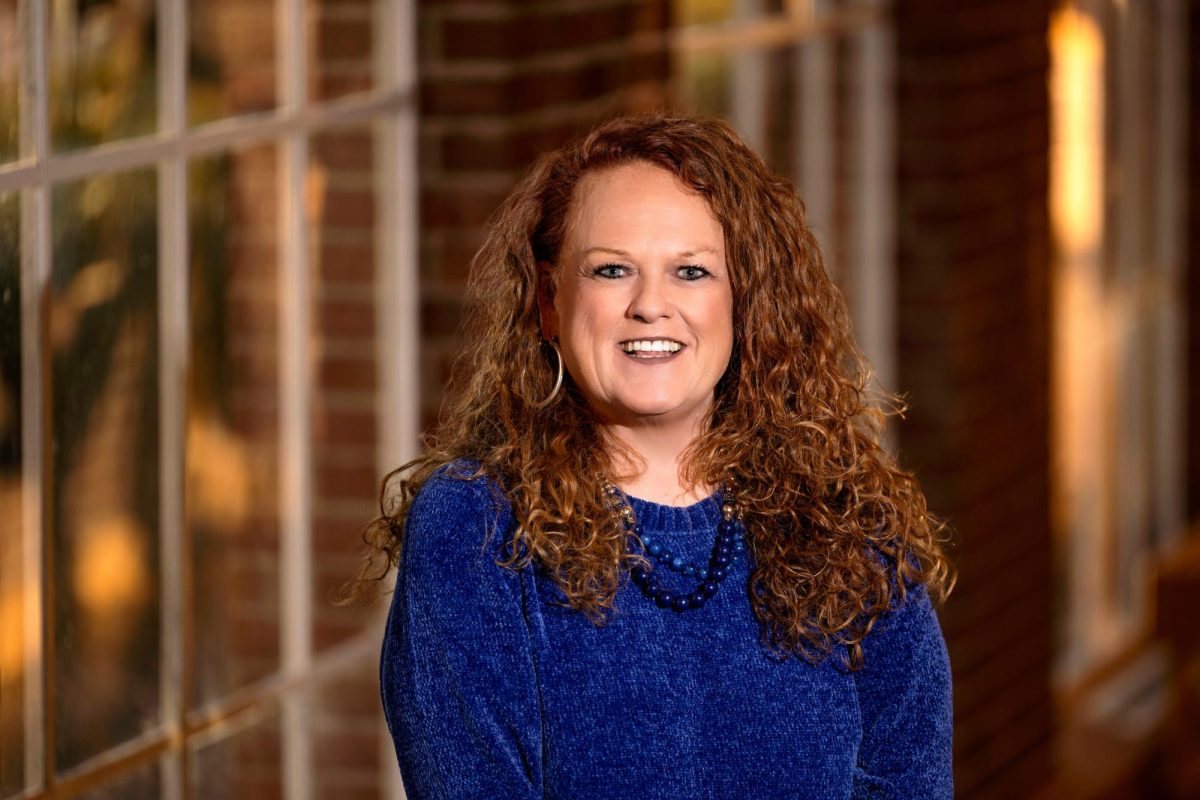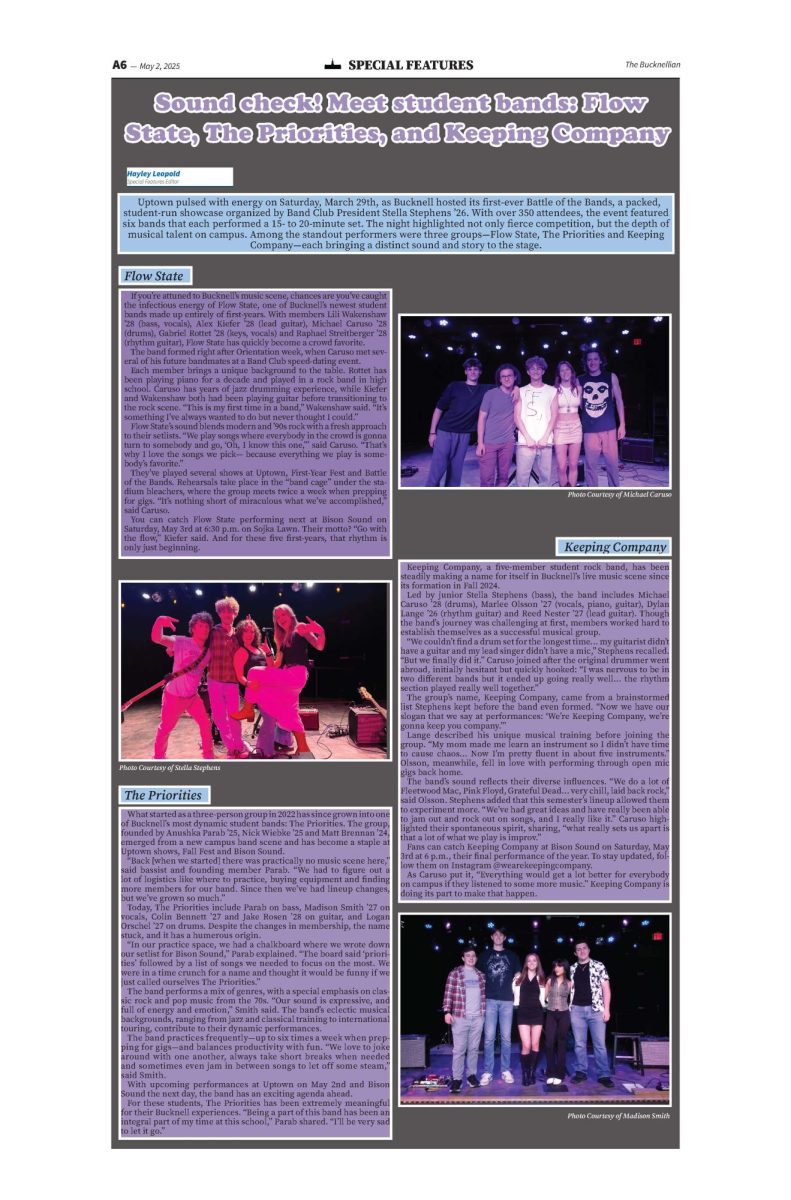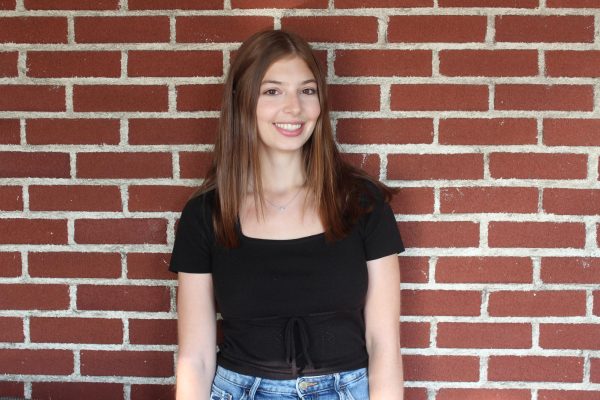Since joining Bucknell’s faculty in 2022, Assistant Professor of Sociology Apollonya Porcelli has quickly become a dynamic and influential figure in the department. With a background that spans environmental sciences, sociology and marine biology, Porcelli brings an interdisciplinary approach to her work, blending her passion for environmental justice with her dedication to student mentorship. Her research, teaching and personal journey reflect a deep commitment to understanding and addressing the social and environmental issues that shape our world, making her a standout presence on campus.
Professor Porcelli’s academic path didn’t start with sociology but with environmental sciences. As an undergraduate at Cornell University, she majored in environmental sciences and studied abroad in Brazil. It was during this time that her interest in the intersection between the natural and social worlds began to emerge. “I started to get more interested in the social sciences side of things,” she recalls. While researching subsistence-based fisheries in Brazil and Nicaragua, she realized the deep connections between social dynamics and environmental issues.
When she pursued graduate studies, Porcelli knew she wanted to explore this intersection further but didn’t want to limit herself to the natural sciences. At Brown University, she found the perfect fit, earning a Ph.D. in Sociology alongside a master’s in Marine Biology. “It was a dream,” she says. “Being able to both do natural science fieldwork and really double down on sociological theory and methods.” Her dissertation research in Peru examined the influence of social movements on environmental policy, focusing on the industrial fishery sector.
Porcelli’s passion for environmental justice goes beyond academics; it’s deeply personal. Reflecting on her childhood, she describes a long-standing love of the natural world. However, her time teaching at an alternative high school after graduating brought her face–to–face with the social inequalities embedded in the U.S. education system. “It was this experience that solidified my love for teaching,” she explains. More importantly, it clarified the ways in which class and race-based inequalities shape public education and, more broadly, society.
At first, she saw her environmental and social justice passions as separate pursuits. But through sociology, she realized they were deeply interconnected. “The same forms of oppression that exploit racial minorities, women and marginalized groups are the same forms that exploit natural resources,” she emphasizes. In her teaching and research, Porcelli consistently highlights the connections between social inequalities and environmental degradation, underscoring that activism in one area often benefits the other.
At Bucknell, Professor Porcelli brings her interdisciplinary educational interests to life in the classroom. She teaches courses ranging from introductory sociology to more specialized electives like environmental sociology and “Oceans and Society”. While she enjoys teaching all her courses, she has a particular fondness for introductory sociology. “Part of me just loves teaching intro to sociology so much because I get to talk about a whole host of issues that I never get to talk about in my research,” she says. The enthusiasm of first and second-year students encountering these concepts for the first time adds to the excitement.
However, it’s in her upper-level electives where Porcelli’s creativity truly shines. Her “Oceans and Society” class, for example, is inherently interdisciplinary, drawing from literature, sociology and ecology. Students read everything from John Steinbeck’s Cannery Row to Marxist sociology, and they analyze ecological data on fisheries. Porcelli encourages students from diverse academic backgrounds to incorporate their own expertise into discussions and final projects, encouraging students to utilize qualitative oral histories and quantitative data analyses in their work.
Porcelli’s current research projects reflect her interdisciplinary focus and commitment to environmental justice. One of her ongoing projects examines two oil spills in Peru – one in the rainforest and another in the marine environment. Her work explores the Peruvian government’s inadequate response to these disasters and highlights the ways extractive industries continue business as usual, despite the environmental harm they cause.
Another project focuses on the United Farm Workers movement in California during the 1960s and 1970s. Through this research, Porcelli explores how the working class generates its own knowledge and uses it to challenge dominant systems. Her larger book project, which she hopes to focus on during an upcoming leave next year, delves deeper into social movement activism surrounding the Peruvian anchovy fishery.
Despite the challenges of balancing research, teaching and family life, Porcelli finds immense joy in her role as a mentor. “The most rewarding thing is getting to know the students,” she says, noting how her relationships with students extend beyond the classroom. Whether she’s working with them on research or simply helping them navigate college life, these connections are crucial. “I think mentorship outside the classroom, both on a personal level and a professional level, is the most valuable,” she reflects.
For students interested in careers related to sociology, environmental justice, or activism, Porcelli’s advice is simple: “Do it!” She encourages students to pursue what genuinely interests them and to make the most of their liberal arts education. “Get weird,” she says with a smile. “Take classes you never thought you’d take. Open your mind, make the most of the liberal arts education and really dig deep.”
Her parting message to students is a call to action: “Don’t accept a broken system! So much of sociology is talking about the ways in which things are broken and how we can fix them. We’re all part of it and we can all make a difference.”
In just a short time at Bucknell, Professor Apollonya Porcelli has left an indelible mark on her students, blending academic rigor with a commitment to social and environmental justice. As she continues her research and mentorship, her work serves as a reminder that the fight for equality and sustainability is ongoing – and deeply interconnected.






















